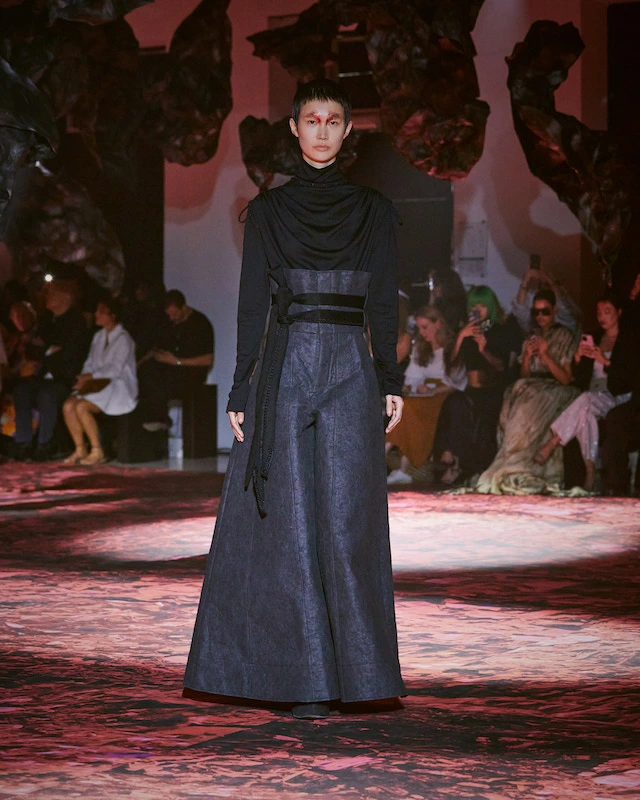The partnership combines digital textile inkjet and dry fiber technologies to create new clothes from recycled, re-fibered fabrics
Epson has further progressed its partnership with renowned Japanese fashion designer Yuima Nakazato and his eponymous YUIMA NAKAZATO brand aims for better sustainability in fashion and has now resulted in the creation of an exciting new couture collection that has been displayed during Paris Haute Couture Fashion Week at the Palais de Tokyo in Paris.
The new collection has been created, in most part, using a combination of Epson’s more sustainable digital textile printing technology and a new fabric production process that has the potential to transform the fashion industry, contributing significantly to the creation of an innovative, colorful, and ground-breaking collection of beautifully designed couture pieces.
Epson’s dry fiber technology, which is already used commercially to recycle paper and requires virtually no water to produce, has been adapted to produce new non-woven re-fiberised fabric from used and discarded garments.
This experimental fabric production process was first revealed in January this year as part of a three-year collaboration between Epson and YUIMA NAKAZATO. Now, for the show in July, Epson has made further significant advances to the quality of the fabric, making it thinner, more flexible and much easier to print on using Epson’s sustainable Monna Lisa direct-to-fabric digital textile printing technology.
As the new collection is revealed, Epson and YUIMA NAKAZATO will raise awareness of the water and material waste associated with traditional and excessive garment production. The Paris Show in July has illustrated how switching to digital textile printing using more sustainable pigment inks offers the fashion industry a less wasteful and more environmentally responsible means of textile printing.
The new couture range displayed at the Palais de Tokyo has been printed using the Epson ML-13000. This is a prototype and highly flexible direct-to-fabric digital textile printer capable of achieving vivid colors with pigment inks on a wide variety of fabrics and surfaces.
The fabric taken to create the new YUIMA NAKAZATO fashion line was derived from material from used garments sourced from Africa, the destination for many discarded garments from elsewhere in the world. Yuima Nakazato visited Kenya where he purchased around 150 kg of used garments destined for the many “clothes mountains” that comprise discarded Western garments.
Epson then applied its dry re-fiberisation process to the waste material which resulted in the production of over 150 meters of non-woven fabric, which was then printed on using pigment inks by Epson’s Monna Lisa digital printing technology.
“Although in its early stages, Epson believes its dry fibre technology combined with pigment ink digital printing could offer the fashion industry a much more sustainable future, significantly reducing water use while allowing designers the freedom to fully express their creativity”, explains Hitoshi Igarashi from Epson’s Printing Solutions Division.
“Since January this year Epson has continued to make significant advances in the quality and printability of re-fiberised fabric. It is now less dense, tougher and much more flexible, making it better suited for printing using Epson’s Monna Lisa direct-to-fabric digital textile printer. The fabric used this time was much thinner than before, leading to a 37.5% weight reduction from 160 g/m 2 previously to 100 g/m 2 now.”
The ML-13000 significantly contributes to reducing the environmental footprint. It uses a pigment ink process that leads to a 96% reduction in water use compared to dye-based inks. It has also increased productivity by 300% compared to conventional production processes thanks to an inline solution involving built-in pre- and post-printing processes.

The prototype ML-13000 is capable of printing not just ink, but also three different types of liquid onto fabric at the same time, thereby enhancing brilliance, durability, and flexibility. Epson has utilized this printer to print on fabric with an optimized balance of ink and liquids.
This innovation achieves quick production, reducing water usage, and saving use of energy. This initiative shows how discarded garments can be upcycled into new types of clothing thanks to the combination of YUIMA NAKAZATO’s creativity and Epson technology.
“Epson’s Environmental Vision commits us to contributing to a circular economy, and this development could be one step towards achieving this. Although still at the experimental stage with textiles, we believe dry fibre technology has tremendous potential for making the fashion industry more sustainable”, concludes Hitoshi Igarashi from Epson’s Printing Solutions Division.





















